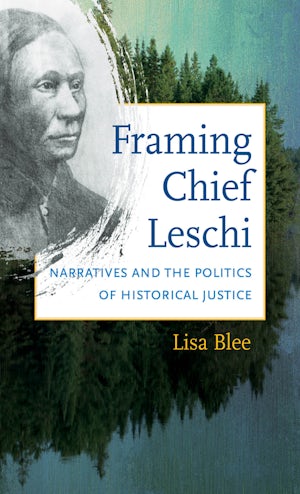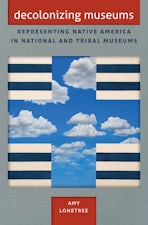Framing Chief Leschi
Narratives and the Politics of Historical Justice
By Lisa Blee
320 pp., 6.125 x 9.25, 13 halftones, 1 map, notes, bibl., index
-
Paperback ISBN: 978-1-4696-1284-3
Published: March 2014 -
E-book PDF ISBN: 979-8-8908-4537-5
Published: March 2014 -
E-book EPUB ISBN: 978-1-4696-1285-0
Published: March 2014
Buy this Book
- Paperback $39.95
- E-Book $25.99
For Professors:
Free E-Exam Copies
Though the Historical Court's verdict was celebrated by Nisqually people and many non-Indian citizens of Washington, Blee argues that the proceedings masked fundamental limits on justice for Indigenous people seeking self-determination. Underscoring critical questions about history and memory, Framing Chief Leschi challenges readers to consider whether liberal legal structures can accommodate competing narratives and account for the legacies of colonialism to promote social justice today.
A project of First Peoples: New Directions in Indigenous Studies
About the Author
Lisa Blee is assistant professor of history at Wake Forest University.
For more information about Lisa Blee, visit
the
Author
Page.
Reviews
“Framing Chief Leschi adds to the already-impressive multipress series, First Peoples: New Directions in Indigenous Studies.”--Journal of American History
“Serves as an example of the ways in which symbolic actions can promote and encourage change, altering the public mentality and reaffirming Native agency in the rewriting of American history.”--Pacific Northwestern Quarterly
“Provides a nuanced look at historical memory and the search for historical justice. . . . Readers interested in the study of historical memory, oral traditions, colonialism, justice, law, and American Indians will find the book a valuable case study.”--Ohio Historical Quarterly
"Blee uses the Historical Court as an opening for nuanced and sophisticated discussions of the framing of war, violence, dispossession, memory, and justice under a liberal colonial regime."--NAIS
"Blee's study of contested history and an Indian leader's evolving significance illustrates in fresh, compelling ways the complex nature and importance of the endeavor we call history. It will no doubt be useful to scholars in several fields, particularly American Indian, public, Pacific Northwest, or Western history. It could be a valuable teaching tool for students of historical method and historical memory, both graduate and undergraduate."--Alexandra Harmon, author of Rich Indians: Native People and the Problem of Wealth in American History
"While on its face this book is about Chief Leschi's history, re-trial, and role in the Pacific Northwest, Blee makes its purpose and argument more about the complexity, and even impossibility, of disentangling history and memory in the effort to engage the U.S. history and present of colonialism, and thus also the effort to move towards justice for indigenous peoples."--Kevin Bruyneel, Babson College


